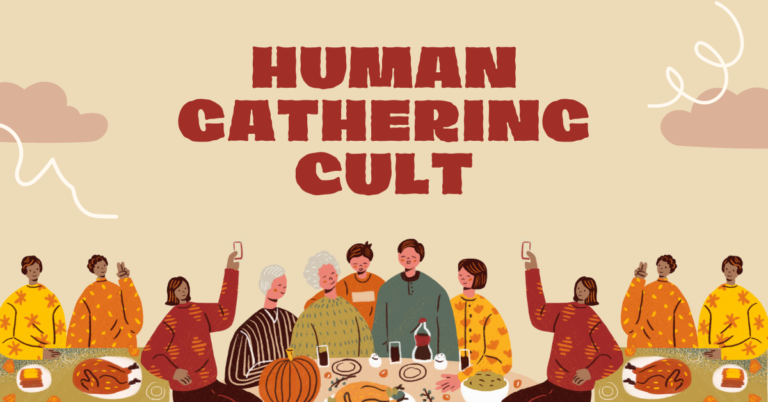Human Gathering Cult- Human gatherings have been an integral part of society for centuries, serving as avenues for socialization, collaboration, and the exchange of ideas. Within this realm, certain groups emerge with characteristics that transcend typical gatherings, forming what is commonly referred to as “cults.” This article delves into the intricate world of human gathering cult, exploring their dynamics, influences, and implications on individuals and society as a whole.
Unpacking the Term “Cult”
When we hear the term “cult,” it often evokes negative connotations and sensationalized imagery. However, a nuanced understanding reveals that cults exist on a spectrum, ranging from benign and spiritually enriching communities to manipulative and destructive groups. Key characteristics of cults include:
- Charismatic Leadership: Cults often revolve around a charismatic leader who exerts significant influence over members through persuasion, manipulation, or sheer charisma. These leaders typically hold sway over the group’s belief system and decision-making processes.
- Isolation and Control: Cults frequently isolate members from external influences, controlling their access to information, relationships, and resources. This isolation fosters a sense of dependence on the group and reinforces group cohesion.
- Distinct Belief System: Cults espouse a distinct belief system or ideology that serves as the foundation of group identity and cohesion. This belief system may be spiritual, political, or centered around a particular philosophy.
- Intense Group Dynamics: Cults foster intense group dynamics characterized by loyalty, conformity, and obedience to authority figures. Members may experience a sense of belonging and purpose within the group, leading to strong emotional bonds.
Psychological Underpinnings of Cult Attraction
Understanding why individuals are drawn to cults requires delving into psychological theories and human behavior:
- Social Identity Theory: Individuals seek to belong to groups that enhance their self-esteem and identity. Cults offer a sense of belonging and purpose, fulfilling psychological needs for affiliation, acceptance, and meaning.
- Vulnerability Factors: Certain individuals are more susceptible to cult recruitment due to factors such as loneliness, disillusionment, or a search for meaning. Cults often target vulnerable individuals and exploit their psychological vulnerabilities to recruit and retain members.
- Influence Techniques: Cults employ various influence techniques, such as love bombing (excessive displays of affection and attention), thought reform (manipulating beliefs and attitudes), and group pressure (conforming to group norms). These techniques induce cognitive dissonance and foster dependence among members.
- Manipulation of Cognitive Processes: Cults undermine critical thinking and rationality through manipulation of cognitive processes. This includes tactics such as information control, emotional manipulation, and fear-based conditioning, leading members to adopt the group’s beliefs uncritically.
Evolution of Cults in the Digital Age
The advent of technology has significantly impacted the landscape of cults, giving rise to online communities and digital cults:
- Online Cults: Social media platforms and online forums provide fertile ground for cult recruitment, radicalization, and indoctrination. Algorithms create echo chambers, reinforcing existing beliefs and isolating individuals from diverse perspectives.
- Digital Manipulation: Online cults may exploit digital anonymity and depersonalization to manipulate and control members without face-to-face interaction. This blurs the lines between reality and virtuality, making it challenging for individuals to discern manipulation tactics.
- Digital Disconnection: While technology facilitates connectivity, it can also lead to digital disconnection and depersonalization. Online cults may exploit this disconnection to exert control over members’ thoughts, behaviors, and beliefs.
Implications and Concerns
The prevalence of cults, both offline and online, raises significant concerns and implications:
- Psychological Harm: Manipulative cult practices can lead to psychological harm among members, including cognitive dissonance, identity crisis, and emotional trauma.
- Social Division: Cults that promote extremist ideologies or radicalization can contribute to social division, polarization, and conflict within society.
- Ethical Considerations: Ethical concerns arise regarding the manipulation and exploitation of vulnerable individuals by cults, raising questions about informed consent and autonomy.
- Regulatory Challenges: Regulating cult activities, especially in digital spaces, poses challenges due to the global and decentralized nature of online communities.
Mitigating Cult Influence
Addressing the influence of cults requires a multifaceted approach that involves:
- Education and Awareness: Promoting critical thinking skills, media literacy, and awareness of manipulation tactics can empower individuals to recognize and resist cult influence.
- Support Services: Providing support and resources for individuals who have been affected by cults, including counseling, rehabilitation, and community outreach programs.
- Regulatory Measures: Implementing regulations and policies to monitor cult activities, protect vulnerable populations, and ensure ethical standards in recruitment and indoctrination practices.
- Ethical Leadership: Encouraging ethical leadership and transparency within organizations to prevent the rise of manipulative and exploitative cult-like dynamics.
Conclusion: Navigating the Complexities of Human Gathering Cults
In conclusion, human gathering cult represent a complex phenomenon with deep psychological, social, and ethical implications. While some cults foster positive experiences and community bonds, others engage in manipulative and harmful practices that can have lasting effects on individuals and society. Understanding the dynamics, influences, and implications of cults is essential for promoting informed decision-making, safeguarding vulnerable populations, and fostering a culture of critical thinking and ethical leadership. As we navigate the complexities of human gathering cult, it is imperative to approach the topic with nuance, empathy, and a commitment to promoting well-being and resilience.

